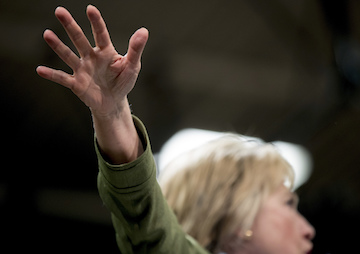Hillary Clinton and Her Hawks
Clinton’s speech accepting her party's nomination sidestepped the deep concerns anti-war Democrats have about her hawkish foreign policy, which is already taking shape in the shadows. 1
2
1
2
Panetta was deliberately conflating two different issues in supporting more U.S. Special Forces in Syria. The existing military mission for those forces is to support the anti-ISIS forces made up overwhelmingly of the Kurdish YPG and a few opposition groups.
Neither the Kurds nor the opposition groups the Special Forces are supporting are fighting against the Assad regime. What Panetta presented as a need only for additional personnel is in fact a completely new U.S. mission for Special Forces of putting military pressure on the Assad regime.
He also called for increasing “strikes” in order to “put increasing pressure on ISIS but also on Assad.” That wording, which jibes with the Flournoy-CNAS recommendation, again conflates two entirely different strategic programs as a single program.
The Panetta ploys in confusing two separate policy issues reflects the reality that the majority of the American public strongly supports doing more militarily to defeat ISIS but has been opposed to U.S. war against the government in Syria.
A poll taken last spring showed 57 percent in favor of a more aggressive U.S. military force against ISIS. The last time public opinion was surveyed on the issue of war against the Assad regime, however, was in September 2013, just as Congress was about to vote on authorizing such a strike.
At that time, 55 percent to 77 percent of those surveyed opposed the use of military force against the Syrian regime, depending on whether Congress voted to authorize such a strike or to oppose it.
Shaping the Debate
It is highly unusual, if not unprecedented, for figures known to be close to a presidential candidate to make public recommendations for new and broader war abroad. The fact that such explicit plans for military strikes against the Assad regime were aired so openly soon after Clinton had clinched the Democratic nomination suggests that Clinton had encouraged Flournoy and Panetta to do so.
The rationale for doing so is evidently not to strengthen her public support at home but to shape the policy decisions made by the Obama administration and the coalition of external supporters of the armed opposition to Assad.
Obama’s refusal to threaten to use military force on behalf of the anti-Assad forces or to step up military assistance to them has provoked a series of leaks to the news media by unnamed officials — primarily from the Defense Department — criticizing Obama’s willingness to cooperate with Russia in seeking a Syrian ceasefire and political settlement as “naïve.”
The news of Clinton’s advisers calling openly for military measures signals to those critics in the administration to continue to push for a more aggressive policy on the premise that she will do just that as president.
Even more important to Clinton and close associates, however, is the hope of encouraging Turkey, Saudi Arabia and Qatar, which have been supporting the armed opposition to Assad, to persist in and even intensify their efforts in the face of the prospect of U.S.-Russian cooperation in Syria.
Even before the recommendations were revealed, specialists on Syria in Washington think tanks were already observing signs that Saudi and Qatari policymakers were waiting for the Obama administration to end in the hope that Clinton would be elected and take a more activist role in the war against Assad.
The new Prime Minister of Turkey, Binali Yildirim, however, made a statement on July 13 suggesting that Turkish President Recep Yayyip Erdogan may be considering a deal with Russia and the Assad regime at the expense of both Syrian Kurds and the anti-Assad opposition.
That certainly would have alarmed Clinton’s advisers, and four days later, Panetta made his comments on network television about what “the next president” would have to do in Syria.
Gareth Porter is an independent investigative journalist and winner of the 2012 Gellhorn Prize for journalism. He is the author of “Manufactured Crisis: The Untold Story of the Iran Nuclear Scare.”
Your support matters…Independent journalism is under threat and overshadowed by heavily funded mainstream media.
You can help level the playing field. Become a member.
Your tax-deductible contribution keeps us digging beneath the headlines to give you thought-provoking, investigative reporting and analysis that unearths what's really happening- without compromise.
Give today to support our courageous, independent journalists.






You need to be a supporter to comment.
There are currently no responses to this article.
Be the first to respond.